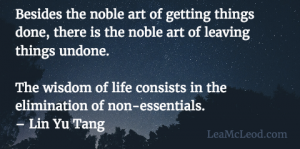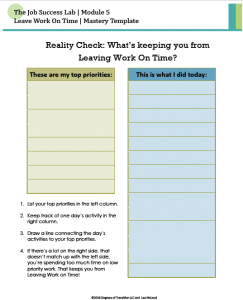Can you relate?
One of the issues that consistently shows up in my inbox is “I can’t get all my work done.” Or, “I can’t get out the door on time.” Or, “email takes so much time, I can’t get to my strategic objectives.”
You probably have a few variations of your own. There’s no doubt that the pressure to get ALL the work done is pressing. I know I feel it every day!
And it’s easy to understand why.
In our always-on, streaming world, things come at you, constantly. Email, texts, instant messaging, Facebook, Twitter, Snapchat, phone calls, and more. Every single one generates a ding, a ring, a flash or a buzz, beckoning you to look. Consequently, they all look and feel urgent.
.
But that’s a trick. They’re really not. And it’s not like this is a surprise … you already knew that, right?
In today’s workplace, ignoring the less important work is as important as doing the most important work.
.

.
Think of this essential skill as “Job Triage.”
Triage is a process used in emergency rooms to “assign degrees of urgency to (wounded or ill patients) to decide the order of treatment.”
If you’ve ever been to an ER, you know the broken finger sits in the waiting room while more serious injuries are treated urgently.
So, what would happen if you triaged your work the way an ER triages patients?
Much like an ER, your job isn’t about doing it all, and responding to it all right now. Your job is to be an expert in what needs a response right now. And what doesn’t.
The order of treatment should be based on that which supports your most critical objectives and deliverables. That comes first. The other stuff needs to chill in the metaphorical waiting room.
You may underestimate the value of “triage” as a job skill. But given the way we all work today, I believe it’s as essential a job skill as actually doing the work you’re an expert in. And we don’t talk about it anywhere nearly as much as we need to.
Want to test your triage ability? Try this simple exercise every day for a week.
Make 2 columns on a piece of paper. On the left side, list your top 3 to 5 most strategic objectives.
On the right side, list all the work you did on a given day. At the end of the day, connect the items in the right hand column that directly serve the objectives on the left.
If you have matches, terrific, you’re likely great at job triage.
.
However, if you have lots of items on the right, that don’t support your key objectives on the left, you have some work to do.
.
Keep those critical objectives right in front of you, and stay focused on that left hand column each day. It may not be easy but the reward will be worth it. We’ll be talking more about this in the weeks to come.
In the mean time, for more on getting big things done without completely burning out, check out this recent post on The Muse.
PhotoCopyright : Wavebreak Media Ltd via 123rf.com

